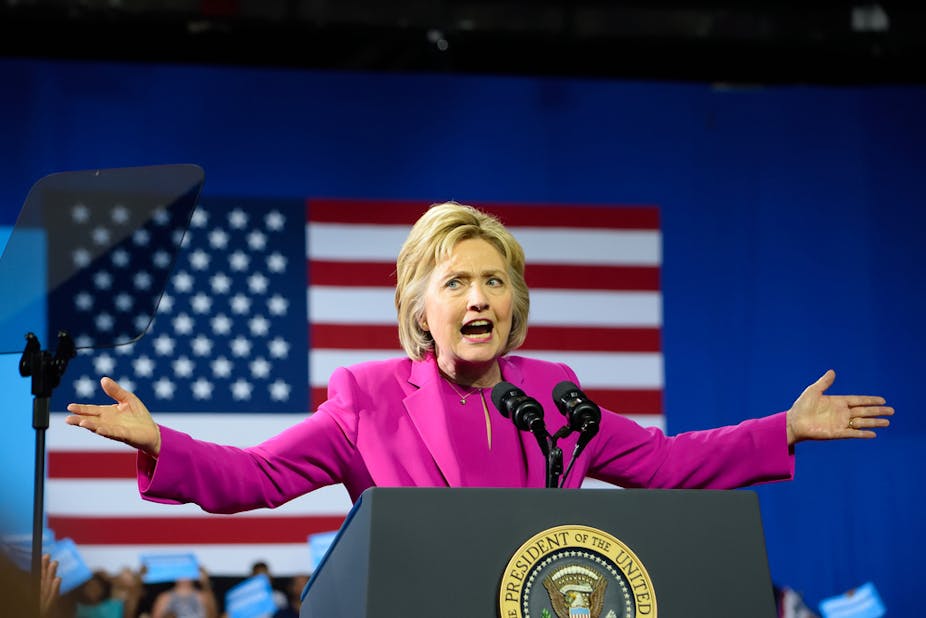Since the news broke of Donald Trump’s election to the presidency of the United States, there has been much incredulity and analysis. How was it that someone as aberrant as Trump could emphatically beat Clinton and gain so much support from Christian voters?
But perhaps this shouldn’t come as a surprise; the reasoning of these voters can be found in the words of Arlene, New Jersey: “The first woman president should have integrity and that historic moment should not be tainted by someone like Hillary Clinton.” Why is it so important for “the first woman president” to have integrity, and to be held to a higher standard than any of her male counterparts? For an answer to this question, we have to turn to the Bible, and acknowledge its continuing role in American public life.
Trump was recognised as a flawed leader but that, according to evangelical leader Franklin Graham, makes him just like the biblical figures of King David or Moses. The emphasis was that “no one is perfect and we all sin”. The illustrious King David, for example, was far from angelic not least in killing 144,000 people.
The president elect has some controversial attitudes towards women – as did David. In fact, David took his to the extreme – he raped Bathsheba before killing her husband when he would not cover up the pregnancy. But for David, a man, that’s apparently no big deal.

Yet the portrayal of Bathsheba hints at the problems facing Clinton when trying to overturn hundreds of years of the Bible being at the heart of culture and society. Bathsheba is long associated with seducing the king. For that she is considered a slut, and is condemned for her wantonness. She is a bad woman because, in the Bible, women come in only two forms: good or bad.
Different standards
That takes us back to Graham’s suggestion that no one is perfect, and we all sin. Unfortunately, that doesn’t really apply to women – as “Arlene” points out. And it certainly doesn’t apply when a woman is breaking a glass ceiling. Women have to be better than that – women must be extraordinary, the Bible tells us so.
Ordinary women are few and far between in the Bible, unlike their male counterparts. Those women who are named and given identity are so good they are brilliant. They have to be astonishing, to quote Elisabeth Schüssler Fiorenza, and their behaviour has to be exceptional and beyond reproach, especially when taking on powerful or significant roles.
The Virgin Mary is the quintessential example: eternally remembered for her chastity, obedience and her willingness to disappear from the story to allow a man to come to the fore. She is far from the only one. In the gospels, women’s discipleship is only ever painted as exemplary.
The same women, however, face challenges to their virtue and attention is frequently drawn to their sexuality. A woman’s sexuality, of course, is bad. It’s why Mary needed to be a virgin before bearing Jesus, and it is how a woman’s goodness remains constantly at risk. If a woman is not good, then there is no middle ground. She’s bad or, to quote the president-elect, “nasty”.
As Bathsheba shows, it does not take much to become a bad woman – it can be as little as attracting unwanted attention. In Clinton’s case, it is primarily focused around being married to a flawed man. Whether or not she had divorced Bill for his infidelity, she is associated with the Clinton brand and will be condemned for his misdeeds.
‘Nasty’ women
The email fiasco certainly did not help, nor did her record on foreign policy. They reinforced the message that Hillary was not a good woman and therefore, in the eyes of “Arlene” and many like her, unsuitable to be president. This latent, underlying belief about women, inherited from the Bible and reinforced through constant reiteration in society, was just waiting to be stoked.
So when Trump described Hillary as a “nasty woman” in the final broadcast debate, he pushed that button. Trump invited his audience to return to their deeply ingrained, inherited, biblically-coded gender expectations. No wonder he did so well with the evangelical Christian audience. He told them what they wanted, and expected, to hear: you cannot trust a woman unless she is good.
Despite the link being made between Trump and the biblical heroes, his Christian media supporters offered no named biblical counterpart for Clinton. She was not labelled Jezebel, Delilah or any of the other vilified biblical women, but the inference remained: they are all nasty women. No nasty woman will be the first female president, no matter how qualified or experienced, and no matter how bad the male alternative is. So sayeth the Bible.

